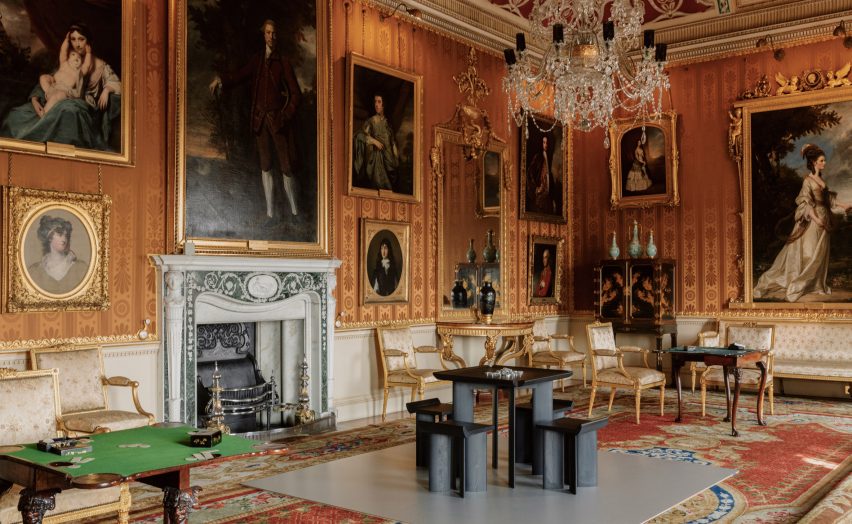British designer Mac Collins has installed a Jamaican-inspired dominoes table inside Harewood House – an English country house with historic ties to the slave trade – in a "corrective act of representation".
Open Code is Collins' contribution to the second Harewood Biennial, which asked contributors to demonstrate a "radical act" of craft.
The Nottingham-based designer crafted a games table and four stools in oak, then added a cast aluminium set of dominoes – a game with deep roots in Jamaican culture.
The design is a direct response to Harewood House's history, which resonates with Collins' own Jamaican heritage.
Located in West Yorkshire, the 18th-century house was built as the family home of plantation owner Edwin Lascelles, using income raised through the sugar and transatlantic slave trade in the West Indies.
"When I first came to Harewood, something that struck me was that, although I'd never been to that place before, my history is entwined," Collins said.
"When you understand the history how these places were funded and conceived it can be quite jarring," he continued, "it can feel almost like a celebration of how lucrative an industry was that ultimately exploited people."
"I think it's important that the audience can engage with and recognise the history of the house and recognise the Caribbean community that is inherently linked with these kinds of locations."
Open Code is installed in the Cinnamon Drawing Room, underneath a portrait of Lascelles.
The room would traditionally be set up with games tables, as a place to retire to after dinner or formal events.
With his installation, Collins wanted to bring a positive Black narrative into this once-exclusive space.
"I think about the time when some of the family and guests who visited the house would have used this space," said Collins. "It's a reminder that it was enjoyed at the expense of the communities I descend from."
Collins' table, which is stained black with a lacquer finish, sits in between two antique games tables from Harewood House's permanent collection.
With its strong vertical lines and angular details, it stands in direct contrast to the more ornate style of Thomas Chippendale, who designed most of Harewood's original furniture.
Open Code is one of 18 projects in the Harewood Biennial 2022, Radical Acts, which is curated by Hugo Macdonald.
Collins is also behind another of these projects. A pink version of his afrofuturist Iklwa chair is exhibited in the Ante Room, to invite visitors to sit and reflect on their environment.
This design was Collins' breakthrough project and another that makes reference to his dual heritage – something he discussed in a recent interview with Dezeen.
Open Code exemplifies the ambition of Jane Marriott, director of the Harewood House Trust, when she initiated the Harewood Biennial. Her aim was to explore how craft can address social and political issues.
The first edition, Useful/Beautiful, took place in 2019 and explored the relevance of craft in the digital age. Radical Acts goes one step further, exploring how craft can be used to effect social change.
"We knew we couldn’t do a biennial that was just about beautiful objects and the process of making," she said.
"We want to engage in the issues of our time and do it in a way that shines a light on an optimistic future."
The Harewood Biennial 2022 is on show from 26 March to 29 August at Harewood House in West Yorkshire. See Dezeen Events Guide for an up-to-date list of architecture and design events taking place around the world.
The photography is by Edvinas Bruzas.

